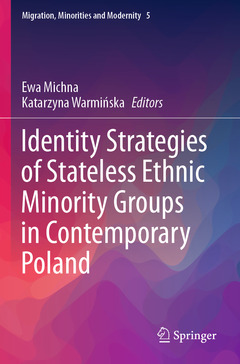Identity Strategies of Stateless Ethnic Minority Groups in Contemporary Poland, 1st ed. 2020 Migration, Minorities and Modernity Series, Vol. 5
Coordonnateurs : Michna Ewa, Warmińska Katarzyna

Introduction: Ewa Michna, Katarzyna Warmińska.- Equal and more equal: Stateless ethnic communities and Polish public policy 1989-2018: Sławomir Łodziński.- The Roma community: from marginalization to integration and back : Ewa Nowicka, Maciej Witkowski.- Between recognition and the struggle for survival. Lemkos at the beginning of the twenty-first century: Ewa Michna.- We are the same but different. The processes of identity construction in the case of Polish Tatars: Katarzyna Warmińska.- Fewer Karaims, but more Karaim issues: Longin Graczyk.- Are we an ethnic group or a nation? The strategies of Kashubian leaders’ identity politics: Katarzyna Warmińska.- Silesians’ struggle for recognition. Emancipation strategies of Silesian ethnic leaders: Ewa Michna.
Ewa Michna PhD habil., sociologist working on issues of ethnicity and nationalism. Her research interests focus around ethnic and national minorities in Central and Eastern Europe, struggle of minority communities for their recognition and the identity politics of ethnic leaders. She has conducted fieldwork among Lemkos, Carpatho-Rusyns in Slovakia and Ukraine and Silesians. She published over forty peer-reviewed articles and two books: “Łemkowie. Grupa etniczna czy naród?” (The Lemkos. An Ethnic Group or a Nation?), 1995; „Kwestie etniczno-narodowościowe na pograniczu Słowiańszczyzny wschodniej i zachodniej. Ruch rusiński na Słowacji. Ukrainie i w Polsce” (Ethnic and National Issues in the Borderlands of Eastern and Western Slavic World. The Rusyn Movement in Slovakia, Ukraine and Poland”), 2004. She is an associated professor at the Institute of American Studies and Polish Diaspora, Jagiellonian University, Krakow.
Katarzyna Warmińska, PhD habil., is an sociologist working on ethnic and identity issues. Her main interests concentrate on ethnic identity, politics of identity, minority – majority relations and anthropological practice. She has conducted fieldwork among Polish Tartars and Kashubians and has published research results in over fifty peer-reviewed articles and in her book “Tatarzy polscy. Tożsamość religijna i etniczna” (Polish Tartars. Religious and ethnic identity), 1999. She has also co-edited tree books. She is a professor associated with the Department of Sociology at Cracow University of Economics.
A unique publication concerning stateless minorities in Poland
Portrays identity politics carried out by minority groups in the specific context of statelessness
Describes identity processes and identity politics of minority groups, within the context of intra-group relations, state policy and global discourse on minority rights
Date de parution : 04-2021
Ouvrage de 173 p.
15.5x23.5 cm
Disponible chez l'éditeur (délai d'approvisionnement : 15 jours).
Prix indicatif 116,04 €
Ajouter au panierDate de parution : 04-2020
Ouvrage de 173 p.
15.5x23.5 cm
Disponible chez l'éditeur (délai d'approvisionnement : 15 jours).
Prix indicatif 105,49 €
Ajouter au panier

